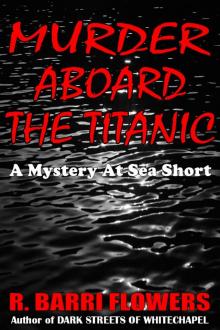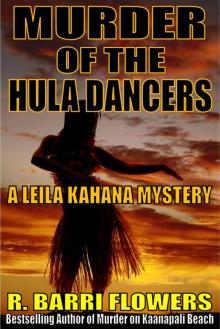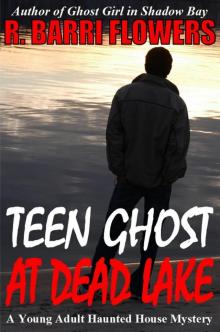- Home
- R. Barri Flowers
Murder Aboard the Titanic: A Mystery At Sea Short
Murder Aboard the Titanic: A Mystery At Sea Short Read online
MURDER ABOARD THE TITANIC
A Mystery At Sea Short
By R. Barri Flowers
Cover Image Copyright 2014 by Art Studio
Used under license from https://www.shutterstock.com
MURDER ABOARD THE TITANIC: A Mystery at Sea Short is a work of fiction. Names, characters, places, and incidents are either the product of the author's imagination or are used fictitiously. Any resemblance to actual events, locales, business establishments, or persons, living or dead, is entirely coincidental.
* * *
In memory of the victims of the Titanic and the Whitechapel murders.
* * *
OTHER BOOKS BY R. BARRI FLOWERS
FICTION
Before He Kills Again (A Veronica Vasquez Thriller)
Dark Streets of Whitechapel (A Jack the Ripper Mystery)
Dead in the Rose City (A Dean Drake Mystery)
Fractured Trust (A Renee Steele Legal Mystery)
Justice Served (A Barkley and Parker Mystery)
Killer in The Woods (A Psychological Thriller)
Murder in Honolulu (A Skye Delaney Mystery)
Murder in Maui (A Leila Kahana Mystery)
Persuasive Evidence (A Jordan La Fontaine Legal Thriller)
Seduced to Kill in Kauai (An Exotic Thriller)
State's Evidence (A Beverly Mendoza Legal Thriller)
TEEN FICTION
Christmas Wishes: Laura's Story (A Young Adult Holiday Fantasy)
Count Dracula's Teenage Daughter (A Transylvanica High Novel)
Danger in Time (A Young Adult Time Travel Mystery)
Ghost Girl in Shadow Bay (A Young Adult Haunted House Mystery)
Out for Blood (A Transylvanica High Novel)
Summer at Paradise Ranch (A Young Adult Adventure Series)
Teen Ghost at Dead Lake (A Young Adult Haunted House Mystery)
TRUE CRIME
Masters of True Crime: Chilling Stories of Murder and the Macabre (editor)
Murders in the United States: Crimes, Killers, and Victims of the 20th Century
Serial Killer Couples: Bonded by Sexual Depravity, Abduction, & Murder
The Sex Slave Murders: The True Story of Serial Killers Gerald & Charlene Gallego
TRUE CRIME SHORTS
Dead at the Saddleworth Moor: The Crimes of Ian Brady & Myra Hindley
Killers of the Lonely Hearts: The Tale of Serial Killers Raymond Fernandez & Martha Beck
Mass Murder in the Sky: The Bombing of Flight 629
Murder at the Pencil Factory: The Killing of Mary Phagan 100 Years Later
Murder of a Star Quarterback: The Tragic Tale of Steve McNair & Sahel Kazemi
Murder of the Banker's Daughter: The Killing of Marion Parker
The Amityville Massacre: The DeFeo Family's Nightmare
The "Gold Special" Train Robbery: Deadly Crimes of the D'Autremont Brothers
The Pickaxe Killers: Karla Faye Tucker & Daniel Garrett
The Sex Slave Murders 2: The Chilling Story of Serial Killers Fred & Rosemary West
* * *
PRAISE FOR MYSTERY AND THRILLER FICTION
BY R. BARRI FLOWERS
"It gets no better than this! R. Barri Flowers has written another thriller guaranteed to hold onto its readers!" — Huntress Reviews on DARK STREETS OF WHITECHAPEL.
"BEFORE HE KILLS AGAIN is a rocket of a read. Not only a heart-thumping thriller, this is that rare novel that is downright scary. Pick it up at your peril, because you won't put it down until you've read the last word." — John Lutz, Edgar winner and bestselling author of Twist
"A masterful thriller set in the dark underbelly of Maui, with lots of fine action, down and dirty characters, and the vivid details of police procedure one would expect from an author who is also a top criminologist. A terrific read!" — Douglas Preston, co-creator of the bestselling Pendergast series of novels on MURDER IN MAUI
"An exquisitely rich and masterfully constructed mystery.... A savvy, smooth, and sumptuous read that's as hot as Waikiki beach sand." — Jon Land, bestselling author of Strong Vengeance on MURDER IN HONOLULU
"A gripping and tightly woven tale you won't want to put down. Author Flowers neatly contrasts the natural beauty of a tropical paradise with the ugliness of murder and its aftermath." — John Lutz, Edgar winner and bestselling author of Pulse on MURDER IN MAUI
"R. Barri Flowers writes with the passion and knowledge of someone who truly knows his craft. A steamy, non-stop thrill-ride through the seamy underbelly of Hawaii." — Allison Leotta, former federal prosecutor and author of Discretion on MURDER IN MAUI
"Flowers has once again written a page-turner legal thriller that begins with a bang and rapidly moves along to its final page." — Midwest Book Review on STATE'S EVIDENCE
"A model of crime fiction.... Flowers may be a new voice in modern mystery writing, but he is already one of its best voices." — Statesman Journal on JUSTICE SERVED
"An excellent look at the jurisprudence system...will appeal to fans of John Grisham and Linda Fairstein." — Harriet Klausner on PERSUASIVE EVIDENCE
* * *
TABLE OF CONTENTS
Murder Aboard the Titanic
Love Aboard the Titanic – bonus short story
Dark Streets of Whitechapel: A Jack the Ripper Mystery Novel – bonus excerpts
About the Author
* * *
MURDER ABOARD THE TITANIC
In the wee hours of the morning on April 10, 1912, Erica Bromley made her rounds along the docks in Southampton, England. A thick fog hung over the city like a shroud. Erica pulled the frumpy wool coat closer to her body as the damp chill in the air made her bones rattle.
Born and raised in Glasgow, Scotland, she had been on her own since the age of sixteen when her stepfather kicked her out of the house after she told her mother that he had been coming into her bedroom for years while her mother was asleep. Her mother said she was a tramp and her stepfather called her a slut. So she was out on the street, forced to fend for herself. Now forty-one, she had done whatever it took over the years to survive. And selling her body had proven to be the most reliable source of income.
She had been living in Southampton for three years now. Fishermen and others by the docks had shown a fondness for redheads with long legs. Atop her head was a thick mass of dirty crimson hair that all but obscured her smudged face and rich green eyes. What was once a stunning and curvaceous body had become somewhat flabby; further bogged down by the layers of clothing she wore to keep warm.
Even with the murky gray fog making it difficult to see, the huge ship stood out as if it was a great monster that had risen from the depths of the sea. Erica marveled at it for a moment or two. She imagined what it must be like to sail to America, the land of opportunity, as so many people would be doing a few hours from now.
Reality quickly set in. In her mind, any opportunity for a better life had gone away a long time ago. She was too old, too wretched, and too damaged to expect any semblance of a bright future. The best she could hope for was to maybe someday be able to get off the streets and die with dignity.
Right now, however, that had to take a back seat to making money for food and shelter. There were only a few people milling about this morning. Those who passed by Erica Bromley either ignored her or nodded as a common courtesy. One man, however, had taken a special interest in her. He had noticed her even before she came to the docks, having followed her from a rooming house where she spent half the night.
Now she was coming towards him while he stood in the shadows...
"Morning," he told her.
"Morning
to you," Erica said, forcing a pretty smile.
"Would you like some company?" the man asked.
She detected an accent in his speech, which she believed to be American, having dealt with a few of them in her line of work. She imagined him to be from the eastern part of America, even if she suspected he would probably prefer to keep that to himself. Though she couldn't quite make out his face, she could tell that he was rather tall and solidly built.
"I would," she told him, buoyed at the prospect of a paying customer.
"Good," he said. "So would I." He looked stealthily around them. Seeing no one close by, he gave her an exaggerated smile. "How much?"
Deciding by his upper class attire that he could afford to pay more than her usual customers, Erica told him confidently, "Fifty quid."
She watched him pull a single bill from his top coat and hand it to her. She grabbed it, stuffing the bill into her brassiere.
"Where to?" she asked.
"Over there," he said smoothly, gesturing with his head down the dock, away from the great ship.
She followed him in the fog and shadows until they came to a spot of gravel just beneath the dock. She had hoped they would go somewhere warm and cozy, but hid her disappointment, thankful to have more money than she had made in some time.
The gleaming steel blade seemed to cut through the fog like a bright light, catching Erica's eye. Before she even realized it was a knife, the blade had already sliced across her throat. As blood raced down her clothing, she gagged and choked, clutching at her throat...or what was left of it.
Then he dug the knife deep into her chest, holding her up by the strength of the cold, sharp blade. Mercifully for Erica, the pain subsided as consciousness faded from her like a distant memory. She would never be aware of the mutilation her body was about to undergo, for he was just getting started.
* * *
I peered out the window of my room at the Westchester Hotel in New York City. It was the middle of October in 1912 and the snow was coming down at an alarming pace, sticking to everything in its path like glue. I drew on my pipe, a habit I had acquired in the last few months. I wasn't sure why, precisely, other than it gave me a strange sense of security. Freedom. Or perhaps belonging.
A Briton, I inherited the name Drake Darrow from my father, a second generation Englishman. This was my second trip to America since retiring from Scotland Yard in January, at the age of forty-eight. I had made it to Inspector level before deciding to call it quits while I was still relatively young enough to do something else with my life. Some twenty-four years earlier I had helped with the investigation into the mutilation murders of five prostitutes in London's East End. The killer, who came to be known as Jack the Ripper, had never been apprehended.
I was still being haunted by this unsolved crime when I took my first trip to New York six months ago. It started aboard the ship Titanic and very nearly ended there. I couldn't have fathomed in my worst nightmares that a ghost of the past would once again rear its ugly head.
How does one begin such an extraordinary and frightening tale of a ship, a madman, an iceberg, and those who were unfortunate enough to be caught in the grip of all three?
Perhaps it's best to start with arguably the most grand luxury liner ever to take to the seas before its reputation would be forever tarnished by a date with death, disaster, and destiny: The Royal Mail Steamer (R.M.S.) Titanic...
At the dawn of the twentieth century, competition amongst major ocean lines for control of the rather lucrative North American crossings of emigrants and the very rich was fierce. Seeking to move well in front of the pack, was the collaboration of shipbuilder Harland & Wolff of Belfast and the British shipping company White Star Line. They fancied building two gigantic twin ships that would set the standard for safety, space, economic operation and, most of all, luxury and elegance. As one person put it, these ships would be in effect "complete seagoing exhibitions."
The R.M.S. Titanic was the larger and more elaborate of the two. And grand it was. The Titanic was eleven stories high, a full four city blocks long, and weighed more than 46,000 gross tons. Her 101-ton rudder was the size of a large house.
Moving this massive object through water was no small feat in and of itself. The Titanic rose to the challenge on the strength of two four cylinder engines, each one driving a wing propeller, and a turbine powering the center propeller. The combination added up to over 50,000 horsepower with speeds of up to twenty-five knots.
She came equipped with everything from a gymnasium to a swimming pool to a fully functional hospital, complete with an operating room.
But perhaps what was most impressive about the ship was her watertight construction. It had a double bottom, divided into sixteen watertight compartments, two of which were actually capable of flooding while keeping the ship afloat. This sense of security, along with what some may have considered arrogance, gave the Titanic its reputation as being unsinkable.
The Titanic began its maiden voyage on April 10, 1912, departing amidst much fanfare and bustle from Southampton at twelve noon, en route to New York. The passenger list for this much anticipated journey to America included such prominent names as Allison, Astor, Bishop, Ismay, and Thayer; collectively, the lot represented in excess of $500 million. In all, there were 2,235 passengers and crew on board the Titanic as it set sail.
My arrival on the ship did not actually begin until April 11th in Queenstown, Ireland, where the Titanic made its final stop prior to New York. After retiring from Scotland Yard, I had spent a great deal of time traveling across Europe, supporting myself on savings and modest income from writing crime novels. Having lost my wife ten years earlier to pneumonia and suffering from bouts of loneliness, I had little enthusiasm for staying put in England with an interesting world out there waiting to be explored.
Visiting distant relatives in Ireland gave me a chance to learn something of my roots. I had timed my departure from Queenstown to coincide with the Titanic's stopover to pick up passengers. Having never visited America before, it seemed like the perfect time to do so, since this maiden voyage was, by all accounts, a once in a lifetime experience.
Since my funds had dwindled after retirement much sooner than I cared to admit, I purchased a Second Class ticket, grateful to have managed to avoid Third Class accommodations, which were also known as steerage.
The Titanic left Queenstown at precisely 2:00 P.M. To every man, woman, and child aboard, there was a firm belief that the journey would be one to celebrate, and certainly never forget.
The latter proved to be true in ways none of us could have ever imagined, much less predicted.
I was paired with an American graduate student by the name of George Martin Payne. He was in his mid-twenties, two inches taller than my six foot frame, and somewhat slimmer than my middle sized build. His curly dark blonde hair, wide, close-set brown eyes, and long, straight nose contrasted sharply with my own salt and pepper hair, deep, evenly spaced blue eyes, and slightly crooked nose.
"My first name is just there for effect mostly," George Martin Payne informed me after a stiff handshake. "I've been called Martin all my life."
"Then Martin it is," I assured him. "Drake Darrow," I introduced myself. "No middle name, I'm afraid. As an only child, I suppose my parents never saw fit to tinker with more names than were necessary."
"I'm an only child, too," he said, studying me thoughtfully. "Actually, I had a twin brother, but he died in childbirth so I sort of lived my life for the two of us. I suspect he would have done the same."
It seemed like a perfectly admirable proposition to me, if not somewhat overly sentimental.
We hit it off right away. I hadn't had the pleasure of knowing very many Americans in England, though a good number had managed to find their way across the sea to the Mother Country, but Martin certainly seemed like a decent enough chap.
"I wouldn't have missed this for the world!" he exclaimed, bouncing on his bunk where a tattered copy of Charles Dick
ens' Oliver Twist lay. "The Titanic represents the start of a new age," Martin said. "There's no turning back now."
"I should hope not," I muttered in complete agreement. Somehow the thought of the Titanic going into full retreat made my stomach weak with despair.
Shooting back to his feet as though a bed coil had stung him in the rear, Martin drew his rather thick brows together, and asked almost impetuously, "Without intending to sound morbid, do you suppose this massive vessel is really incapable of sinking?"
It was a very good question and one that I had asked myself a dozen times or more in the days leading up to our departure. And I didn't have a particularly good answer—at least not one of assurance one way or the other. Aside from its sister ship, the Olympic, there was no basis for comparison. On the other hand, there was simply no sound reason to imagine it sinking. Certainly not on its maiden voyage when safety features were least likely to be compromised.
I settled on an answer that seemed both practical and optimistic. "In a worst case scenario," I told him, "such as being rammed solidly by another ship and sustaining serious damage, the Titanic could very well be in trouble. But I'd say the likelihood of that ever being put to the test is minimal at best."
I watched as Martin's features eased, and he said with a forced chuckle, "I think I'm going to like you, Drake. You're painfully honest, yet quick to put the odds in our favor for making it to New York in one piece. Let's have a drink on it, with the obvious assumption it won't be our last."
It was a timely suggestion that I was only too eager to partake in, if only to take full advantage of the ship's hospitality and my admitted predilection for alcohol.
We joined a host of others in the Second Class smoking room where Martin indulged himself in a highball, while I preferred a hot whiskey and water. I found out that Martin had spent a year at Cambridge as a theatre major.
"Getting in was the difficult part," he explained. "But worth it. Studying in England is about the only chance one has these days to be taken seriously as an actor."

_preview.jpg) Ph.D in Murder (A Cozy Mystery Short)
Ph.D in Murder (A Cozy Mystery Short)_preview.jpg) Billy The Kid’s Wife (A Time Travel Romance Short)
Billy The Kid’s Wife (A Time Travel Romance Short) Murder Aboard the Titanic: A Mystery At Sea Short
Murder Aboard the Titanic: A Mystery At Sea Short_preview.jpg) Convinced (A Women’s Suspense Short)
Convinced (A Women’s Suspense Short)_preview.jpg) Target of a Killer (A Crime Thriller Short)
Target of a Killer (A Crime Thriller Short)_preview.jpg) The Phone Call (A Psychological Mystery Short)
The Phone Call (A Psychological Mystery Short)_preview.jpg) Vandals (A Young Adult Thriller Short Story)
Vandals (A Young Adult Thriller Short Story) Quad Squad
Quad Squad_preview.jpg) The Wrong End Of A Gun (A Noir Mystery Short)
The Wrong End Of A Gun (A Noir Mystery Short) Murder of the Hula Dancers
Murder of the Hula Dancers Murder in Maui
Murder in Maui Teen Ghost at Dead Lake
Teen Ghost at Dead Lake Murdered in the Man Cave (A Riley Reed Cozy Mystery)
Murdered in the Man Cave (A Riley Reed Cozy Mystery) Terror in East Lansing: The Tale of MSU Serial Killer Donald Miller
Terror in East Lansing: The Tale of MSU Serial Killer Donald Miller The Jury Has Spoken
The Jury Has Spoken Murder on Kaanapali Beach
Murder on Kaanapali Beach Death by Trial and Error (A Legal Suspense Short)
Death by Trial and Error (A Legal Suspense Short)